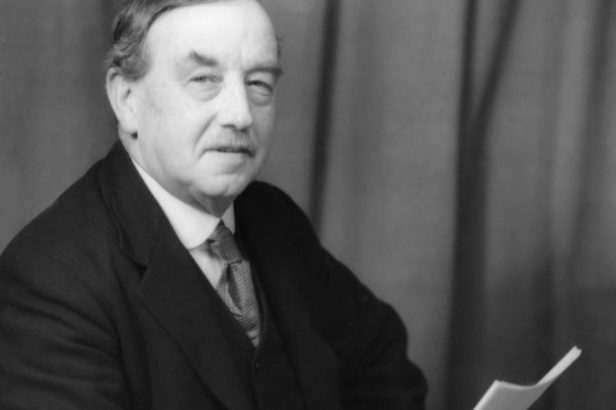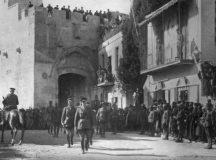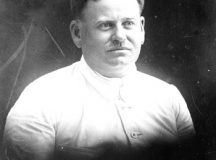Ronnie Fraser tells the little-known story of the British Labour Party’s support for Zionism. Three months before the Balfour Declaration, its War Aims Memorandum made clear that ‘The British Labour Movement expresses the opinion that Palestine should be set free from the harsh and oppressive government of the Turk, in order that the country may form a Free State, under international guarantee, to which such of the Jewish People as desired to do so may return, and may work out their salvation’.
Contrary to popular belief, the Labour Party’s support for Zionism did not originate with the Balfour Declaration but with the Party’s own War Aims memorandum which was published in August 1917, three months before Balfour’s letter. The five thousand word memorandum set out a Socialist and Labour vision for the future, once peace had been achieved. It was divided into six sections; making the world safe for democracy, territorial questions, economic relations, the problems of peace, the restoration of the devastated areas and the reparation of wrongdoing, and a proposal to hold an international conference of labour and socialist organisations. Foremost in the Labour party’s plans was the establishment of the League of Nations. The section on territorial questions proposed solutions for Belgium, Alsace Lorraine, the Balkans, Italy, Poland and the Baltic provinces, the Jews and Palestine, and addressed the problem of the Turkish Empire, Austria-Hungary and the colonies and dependencies. Zionist leader Chaim Weizmann credited the Jewish socialist group, Poale Zion for the inclusion of Jewish rights in the memorandum.
Poale Zion (the Workers of Zion) was a Marxist–Zionist movement which was founded in Eastern Europe at the turn of the 20th century. The ideology of Poale Zion was a blend of socialism and Zionism aimed at persuading Jewish workers to support Palestine as a Jewish homeland as well as campaigning for Jewish equality in all countries. Poale Zion was active in Britain from 1905 onwards and established branches in London, Leeds, Manchester and Liverpool. Throughout the First World War, the organisation, under the leadership of J. Pomeranz and Morris Meyer, the editor of the Jewish Times, campaigned for the granting of political and civil rights for the Jewish people in all countries where they were denied. Their efforts were rewarded when both the 1915 and 1916 Congresses of the Trades Union Congress (TUC) adopted resolutions about the civil and political rights of Jews. [1]
In August 1917, the Labour Party published its draft ‘War Aims Memorandum’ containing the following paragraph on the Jews and Palestine:
The British Labour Movement demands for the Jews in all countries the same elementary rights of tolerance, freedom of residence and trade, and equal citizenship that ought to be extended to all the inhabitants of every nation. It furthermore expresses the opinion that Palestine should be set free from the harsh and oppressive government of the Turk, in order that the country may form a Free State, under international guarantee, to which such of the Jewish People as desired to do so may return, and may work out their salvation free from interference by those of alien race or religion. [2]
The call for political and civil rights for Jews was vague and ambiguous as it proposed that Palestine should become a ‘Free State’; but a Jewish ‘return’ to the country implied an awareness of the historical connection between the Jews and Palestine. It may not have contained everything the Zionists wanted but this was the first official Labour Party declaration relating to the rights of the Jews as well as the first from any political party in Britain. This paragraph was the only one from the memorandum which was to remain as Labour party policy until the State of Israel was established in 1948.
Two months later on 28 December 1917, a special National Conference was held at the Caxton Hall. Over seven hundred delegates from the trade unions and other bodies affiliated to the Labour Party and the TUC voted to accept the War Aims memorandum which had been submitted jointly by the Parliamentary Committee of the TUC and the Executive Committee of the Labour Party. The same evening a joint deputation from the Labour Party and the TUC met the prime minister at Downing Street, where they had a frank discussion about the proposals embodied in the War Aims memorandum. Following the conference the influential journal Zionist Review in January 1918 stated that the inclusion of Jewish emancipation and the recognition of Jewish national claims in Palestine in the War Aims memorandum now had ‘the sanction of the whole international Labour movement, but British Labour has the credit of having taken the initiative and Jews throughout the world owe it a deep duty of gratitude’. [3]
The memorandum was the work of the Parliamentary Committee of the TUC and the Labour Party and was drafted by Arthur Henderson, the leader of the Labour Party, and Sidney Webb. The TUC worked closely with the Labour Party at this time because the TUC had established the Labour Party seventeen years earlier in 1900 as the political wing of the trade union movement in order to protect the interests of labour in Parliament. Henderson became the first Labour member of the cabinet when Prime Minister Asquith formed a coalition government in 1915. He continued to serve in the War Cabinet until August 1917 and throughout his time as a member of the cabinet he would have been aware of the government’s discussions with Chaim Weizmann which resulted in the Balfour Declaration.
There is little evidence available as to why the authors included the section on the Jews and Palestine. Henderson, as secretary of the Labour Party was known to be sympathetic towards Zionist demands for a Jewish homeland in Palestine as well as being aware of the problems of Jewish Labour and the work of the Poale Zion. It is not known if his co-author Webb held similar views. All we can assume is that since he fully supported the aims of the memorandum he was not opposed to the paragraph’s inclusion. However, Webb later became an opponent of Zionism as the author of the 1930 Passfield White Paper which sought to limit Jewish immigration into Palestine.
Chaim Weizmann believed that Poale Zion had been ‘responsible for the favourable declaration of the Labour Party’[4]. However Harry Sacher, a leading member of the influential Manchester Zionists group associated with Weizmann, was sure it was due to his group’s efforts. According to historian Isiah Friedman, shortly after Lord Rothschild had presented the Zionist draft of their demand to Lord Balfour, Sacher helped persuade the Labour Party ‘to include in their manifesto a recommendation that Palestine should be liberated from the Turk and become a free state under guarantee’. After the publication of the memorandum Sacher wrote to his friend Leon Simon that ‘this is the biggest score of a diplomatic kind we have made during the war and with our arrogance it isn’t Chaim or Sokolow and their wangling’s of official personages who have won it but our groups open advocacy’[5].
There is also the need to consider whether the question of the lobbying by Poale Zion and its demands at the international labour and socialist conferences influenced the authors of the memorandum. Poale Zion was invited to send representatives to the 1917 Stockholm conference, a move which the Zionists viewed as recognition of the Jewish people as a distinct nation and that Henderson and Webb were instrumental in any discussions in that forum on the matter. However unless new evidence is discovered it is unlikely that we will ever know all the reasons why Jewish civil and political rights were included in the memorandum. Since only a few records have survived about Poale Zion’s input into the matter we must assume that both they and Sacher played important roles in bringing the Jewish-Zionist question to the attention of Henderson and his colleagues in the Labour party.
The publication of the Balfour Declaration was welcomed by several Labour leaders including Arthur Henderson, George Lansbury and Ramsay MacDonald. The left wing paper The New Statesman wrote: ‘The British Government’s declaration in favour of Zionism is one of the best pieces of statesmanship… It is hard to conceive how anybody with the true instinct for nationality and the desire to see small nations emancipated can fail to be warmed by the prospect of emancipating this most ancient of oppressed nationalities.’ [6]
The Labour Party’s support for Jewish civil and political rights strengthened the influence of Poale Zion within the Jewish Labour movement and led to the establishment of a Jewish National Labour Council which campaigned for socialist and Labour Party candidates during the 1918 Parliamentary elections. In 1920 Poale Zion affiliated to the Labour Party, a move which permitted Poale Zion delegates to speak in the debates on Palestine at Labour Party conferences. Between 1920 and 1948 Poale Zion submitted six motions on the subject.
The memorandum is important because it ignited Labour’s enthusiasm for Zionism and established Poale Zion as the Jewish voice on Palestine within Britain’s Labour Party. Since London was where decisions were made about the political future of Palestine, both the World Confederation of Poale Zion and the Histadrut, the Jewish labour movement in Palestine, sent representatives to London to work with their local people from 1920 onwards until the 1950s. Poale Zion in Britain may have only had a maximum of 2000 members during this period but it built a close relationship with the Labour Party and counted several Jewish Labour MPs within its membership. Both the Dov Hoz (Histadrut) and Berl Locker (Poale Zion) were regularly consulted by the leadership of the Labour Party and by the committee which dealt with imperial questions. As a measure of their appreciation of Hoz’s ability and advice, Labour Party leaders turned out in force at his memorial service in 1940 after his untimely death in a car crash.
But ultimately Poale Zion, despite all its close contacts with the party, failed when it mattered. In 1945 it was unable to change the decision of the Attlee government to ignore prior Labour conference commitments on Palestine. However their legacy was that they had laid the groundwork for the Labour Party’s support for Israel throughout the 1950s and 60s. 100 years after the War Aims Memorandum was issued, Poale Zion’s successor organisation, the Jewish Labour Movement is once again speaking out on Jewish concerns within the Labour Party.
Perhaps Poale Zion’s greatest achievement came in 1930 at the Whitechapel by-election which coincided with the publication of the 1930 Passfield White Paper on Palestine which Poale Zion opposed. Labour eventually won the by-election with a majority of 1000 but only after Poale Zion had agreed to campaign for the Labour candidate after he had agreed to oppose the White Paper and Ernest Bevin, the leader of the Transport Workers Union, had promised that the 26 Labour MPs sponsored by his union would also oppose the terms of the White Paper.
[1] For details of the resolutions and the debate see ‘Political and Civil rights for Jewish people’, 1915 TUC Congress proceedings, pp.306-7 and ‘Political and Civil rights for the Jewish People’, 1916 TUC Congress proceedings, pp.405-6.
[2] ‘Labour Peace Aims, The Times, 11 August 1917.
[3] Zionist Review, January 1918, Vol 1, no. 9, pp. 169.
[4] Letter from Weitzman to Brandeis, 5 March 1918, Weitzman archives.
[5] J. Friedman, The Question of Palestine, British-Jewish-Arab Relations 1914-1918, 1991, pp.254-5.
[6] Balfour Declaration: New Statesman editorial, November, 1917.






































Comments are closed.